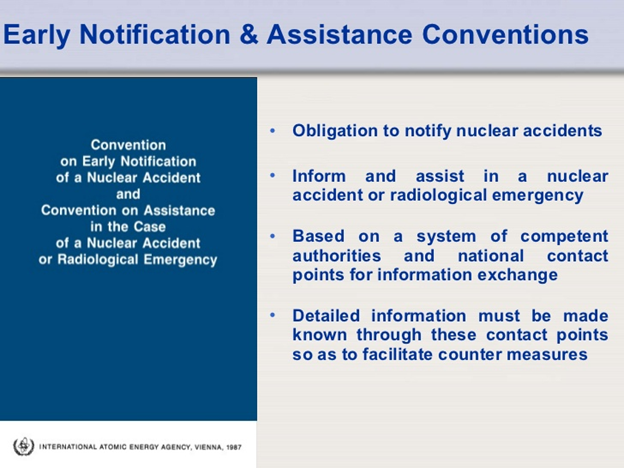The Competent Authorities under the Convention on Early Notification of a Nuclear Accident and the Convention on Assistance in the Case of a Nuclear Accident or Radiological Emergency had a convention in Vienna last week. The representatives to the Competent Authorities are selected by the eighty-five Member States to attend conferences to “carry out specific functions related to nuclear and radiological emergencies.” They are dedicated to continued information exchange as a way to improve emergency preparedness and response (EPR) arrangements. Meetings are held every two years to discuss experiences and challenges of enhancing EPR systems.
One hundred and seventy Competent Authorities representatives and representatives from two other international organizations participated in the Vienna convention to carry out specific functions related to nuclear and radiological emergencies. They discussed the implementation of the conventions. They also discussed topics such as global information exchange, international assistance and public communication techniques.
The Head of the Department of Nuclear Safety and Security for the International Atomic Energy Agency (IAEA) gave an opening address in Vienna. He said that such meetings helped to improve cooperation to ensure that national and international EPR capabilities and arrangements were efficient and prepared to supply effective responses to nuclear and radiological emergencies.
The Director General of the Moroccan Agency on Nuclear and Radiological Safety and Security was the Chair of the Vienna meeting. He stressed that the IAEA Incident and Emergency Centre was very important in promoting and supporting the international EPR framework. He pointed out that the IAEA Centre played an important role in establishing safety standards and validating their relevant application. This is achieved through supporting information exchange and offering Emergency Preparedness Review Service and training. He said that, “Many challenges faced by each Member State are common challenges that we must work on together.”
Lessons learned from a big IAEA international exercise held to simulate the global emergency response to an accident at a nuclear power plant were presented. Meeting participants discussed the importance of regular emergency exercises. They encouraged each other to invite the IAEA and neighboring nations to participate in future national emergency response exercises.
Meeting participants stressed the importance of planning for communications in time of nuclear emergencies to ensure its effectiveness. There were also discussions about the fact that nations that have nuclear power plants need to have different emergency communications than nations that do not have nuclear power plants although there are also big overlaps in their communications as well. The increasing importance of social media in emergency communications was also discussed. The meeting participants called for strengthening of IAEA EPR tools such as Unified System for Information Exchange in Incidents and Emergencies (USIE), International Radiation Monitoring Information System (IRMIS) and the Emergency Preparedness and Response Information Management System (EPRIMS).
The participants agreed that it was very important to harmonize national and regional preparedness arrangements during the preparation phase. They also specifically agreed that Part 7 of the IAEA General Safety Requirements was an excellent reference for such harmonization.
